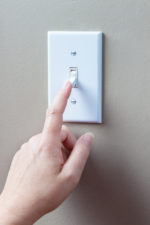Is a Homeowners Association Right for You?
When it comes to moving into a community that has a homeowners association (HOA), it’s important to weigh the advantages and disadvantages. Will the services and amenities offset the restrictions that can be imposed? You will want to ask yourself this question before purchasing in any community run by an HOA.

What is a Homeowner Association?
A little history … in 1970, there were approximately 10,000 homeowner associations, consisting of 2.1 million homes, in the United States. By the end of 2017, that number grew to over 334,000 communities and 70 million residences.
The HOA’s primary role is to manage residential properties and their common areas, ensuring the property values continue to increase over time. HOA’s are nonprofit corporations but the laws will vary from state to state, typically with very little oversight from both the local and state governments.
Why Purchase a Home with a Homeowners Association?
Before deciding to buy a home in an HOA community, it’s important to understand the role they play and how it affects your quality of life. Overall, the goal of an HOA is to promote and maintain uniformity within the neighborhood. The importance of a home’s exterior appearance ranks at the top of their list, therefore, reading and understanding the rules and regulations before purchasing is critical. For example, it may hinder your ability to have free reign over your design choices for the outside of your house—this can include your choice of paint color or the type of plantings you put on your property.
Carefully read through the HOA documents provided to you when entering into a contract of sale. This is the time to evaluate the services, costs, and rules which may affect your purchasing decision. Be sure the seller has paid all bills for any current assessments, and that you are fully aware of the price tag for future special assessments already on the master plan, all of which will raise your monthly HOA fees.

The Pros and Cons of Being a Member of an HOA
Pros
- Property value: Because the main goal of the HOA is to maintain, as a homebuyer, you can have comfort in knowing that the HOA is working to keep your property value at or above your purchase price. Maintaining uniformity in the development, such as requiring a manicured lawn and plantings, approved exterior paint color, and the general overall condition of the outside will contribute to the resale value.
- Amenities: Living in an HOA community grants you exclusive rights and access to the services and amenities inside the development—they are not shared with people outside the community. Of course, guests are allowed but they must be accompanied by another HOA member.
- Accessibility to services: HOA’s can look very different from community to community—typically, the higher the HOA fees, the more amenities that will be available to the homeowner. Where one HOA may provide basic services, such as building maintenance, trash removal, and landscaping, other higher-end communities may have a manned security gate, clubhouse, fitness center, swimming pools, or even a golf course; these more luxurious amenities will come at a cost, probably significantly higher than the cost for basic HOA services.
- Dispute resolution: In a neighborhood where there are no rules and regulations, a conflict may arise with a neighbor, making it quite uncomfortable, anger-provoking, and difficult to resolve. Fortunately, because the HOA has a governing body and a leadership board, a homeowner can discuss the issues with HOA board members to resolve the dispute.
- Social connections: There is something to be said about being part of a community that forges new relationships and friendships. This is especially helpful for those moving in from a different area who do not know anyone. An HOA community usually has organized activities, social gatherings, and events throughout the year, all creating a sense of belonging.
Cons
- Assessments: Even though it’s great to be in an HOA where the homes are well-kept and manicured, it may also create a financial strain for a homeowner if there is a special assessment attached to their HOA bill. This can include roof repairs or replacement, pool or clubhouse renovations, or even road work for the community. Check with your state to see if there are rules regarding special assessments.
- Restrictive covenants:A sizeable number of HOA’s are very stringent with their rules—the goal is always to make sure there is curb appeal and uniformity within the community. There are often architectural committees that will require you to submit your plans for approval for any desired renovations. If you do not follow the rules, don’t be surprised if you receive a letter in the mail. It could be for something that blatantly goes against the HOA rules, and if it’s not rectified within a specified period, you may have to pay a penalty.
- Bad management.Not all HOA communities are created equal. For the most part, homeowners associations are governed by capable HOA boards. There are, however, instances where the managers of the HOA board are sub-par—they lac oversight for the business at hand, which could be due to a lack of expertise, time, or care. Partnering with an HOA management company can help alleviate this problem.
- Tensions between the HOA and homeowners. Some tensions are due to the failure of responding to complaints or not finding a suitable resolution for that complaint. Sometimes the grievance will be against a member of the board of directors, which could result in a power struggle, making a positive outcome more difficult to achieve.

When buying a home with an HOA, the title and mortgage company will check to make sure the HOA is solvent—meaning there is money in their bank account, and dues are paid and up to date. If you’re a cash buyer, be sure to do your due diligence before purchasing.
It is also worth noting that the power of an HOA is real. All fifty states allow an HOA to put a lien on your home or condo if your dues and/or fines are unpaid. It’s also a good time to find out how often the fees have increased over time.
Ultimately, the primary goal of the HOA is to protect the value of the homes in a community. If you want freedom of expression for your home’s exterior, enjoy working on or washing your car on the driveway, your primary vehicle is a commercial vehicle, or you don’t want to worry about potential assessments, or being tied to a monthly fee, an HOA community may not be the right place for you. However, the advantages can outweigh the disadvantages—as a homeowner in an HOA community, you will enjoy the available amenities, feel a sense of belonging with the other homeowners, and have peace of mind knowing that your neighborhood will be well cared for.


















